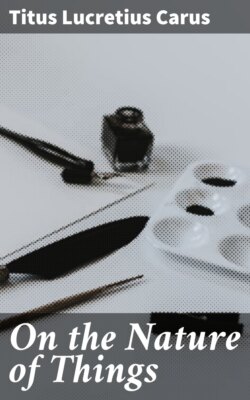Читать книгу On the Nature of Things - Тит Лукреций Кар - Страница 7
На сайте Литреса книга снята с продажи.
NOTHING EXISTS per se EXCEPT ATOMS AND THE VOID
ОглавлениеTable of Contents
But, now again to weave the tale begun,
All nature, then, as self-sustained, consists
Of twain of things: of bodies and of void
In which they're set, and where they're moved around.
For common instinct of our race declares
That body of itself exists: unless
This primal faith, deep-founded, fail us not,
Naught will there be whereunto to appeal
On things occult when seeking aught to prove
By reasonings of mind. Again, without
That place and room, which we do call the inane,
Nowhere could bodies then be set, nor go
Hither or thither at all—as shown before.
Besides, there's naught of which thou canst declare
It lives disjoined from body, shut from void—
A kind of third in nature. For whatever
Exists must be a somewhat; and the same,
If tangible, however fight and slight,
Will yet increase the count of body's sum,
With its own augmentation big or small;
But, if intangible and powerless ever
To keep a thing from passing through itself
On any side, 'twill be naught else but that
Which we do call the empty, the inane.
Again, whate'er exists, as of itself,
Must either act or suffer action on it,
Or else be that wherein things move and be:
Naught, saving body, acts, is acted on;
Naught but the inane can furnish room. And thus,
Beside the inane and bodies, is no third
Nature amid the number of all things—
Remainder none to fall at any time
Under our senses, nor be seized and seen
By any man through reasonings of mind.
Name o'er creation with what names thou wilt,
Thou'lt find but properties of those first twain,
Or see but accidents those twain produce.
A property is that which not at all
Can be disjoined and severed from a thing
Without a fatal dissolution: such,
Weight to the rocks, heat to the fire, and flow
To the wide waters, touch to corporal things,
Intangibility to the viewless void.
But state of slavery, pauperhood, and wealth,
Freedom, and war, and concord, and all else
Which come and go whilst nature stands the same,
We're wont, and rightly, to call accidents.
Even time exists not of itself; but sense
Reads out of things what happened long ago,
What presses now, and what shall follow after:
No man, we must admit, feels time itself,
Disjoined from motion and repose of things.
Thus, when they say there "is" the ravishment
Of Princess Helen, "is" the siege and sack
Of Trojan Town, look out, they force us not
To admit these acts existent by themselves,
Merely because those races of mankind
(Of whom these acts were accidents) long since
Irrevocable age has borne away:
For all past actions may be said to be
But accidents, in one way, of mankind—
In other, of some region of the world.
Add, too, had been no matter, and no room
Wherein all things go on, the fire of love
Upblown by that fair form, the glowing coal
Under the Phrygian Alexander's breast,
Had ne'er enkindled that renowned strife
Of savage war, nor had the wooden horse
Involved in flames old Pergama, by a birth
At midnight of a brood of the Hellenes.
And thus thou canst remark that every act
At bottom exists not of itself, nor is
As body is, nor has like name with void;
But rather of sort more fitly to be called
An accident of body, and of place
Wherein all things go on.
